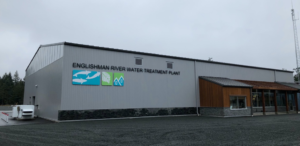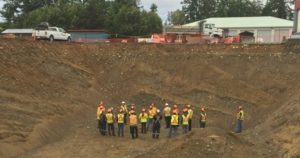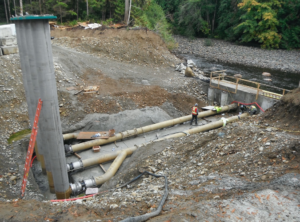A New Water Treatment Plant for Parksville and Nanoose Bay
- Jenni Green, P. Eng
The Englishman River Water Service (ERWS) project is a joint venture between the City of Parksville (74%) and the Regional District of Nanaimo (26%). The project, which now supplies water to the communities of Parksville and the Nanoose Bay water service area, was conceptualized in the early 2000s.
 Over the past 20 years, considerable effort was devoted to planning the water system so it would both meet community needs and be environmentally sound. There are many factors contributing to the need to expand the water supply infrastructure such as greater reliability and security, higher drinking water quality standards and increasing water demands.
Over the past 20 years, considerable effort was devoted to planning the water system so it would both meet community needs and be environmentally sound. There are many factors contributing to the need to expand the water supply infrastructure such as greater reliability and security, higher drinking water quality standards and increasing water demands.
Different water treatment technology processes were reviewed and considered suitable for treating the Englishman River water source. These were:
- Direct filtration
- Conventional treatment (sedimentation/media filtration)
- Dissolved air flotation/media filtration (DAF)
- Membrane filtration
- Ballasted flocculation (Actiflo®/media filtration)
Direct filtration technology was ruled out due to the inability to readily handle turbidity spikes. The pilot testing for dissolved air flotation technology showed that organic material was too heavy to allow this technology to perform well under all conditions. Ballasted flocculation technology uses rapid sand filtration and easily handles high turbidity spikes; however, this technology was determined to be too excessive in low turbidity events and therefore results in high operational costs. Pilot testing determined membrane technology water treatment best suits the Englishman River water source.
 There are naturally occurring microbiological pathogens such as E. coli present in the surface water which has typically been removed using chlorine disinfection. There are also organisms such as Cryptosporidium and Giardia which are not removed with the use of chlorine. The most effective means to ensure such organisms do not find their way into the community’s potable water supply is by using the multi-barrier approach which is required by Island Health to meet their health standards and to be in compliance with Canadian Drinking Water Guidelines.
There are naturally occurring microbiological pathogens such as E. coli present in the surface water which has typically been removed using chlorine disinfection. There are also organisms such as Cryptosporidium and Giardia which are not removed with the use of chlorine. The most effective means to ensure such organisms do not find their way into the community’s potable water supply is by using the multi-barrier approach which is required by Island Health to meet their health standards and to be in compliance with Canadian Drinking Water Guidelines.
The new facility provides water treatment capacity of 16 million liters per day, consisting of membrane filtration, ultra-violet (UV) light and chlorine disinfection. Construction began in 2017 and was substantially completed in December 2019.
 As with any construction project of this magnitude, there were a number of challenges. Over the 2-year construction period, there were close to 100 change orders. At a total cost of $41.7 million dollars, it was the largest, and most expensive, construction project that has ever been completed by the City of Parksville. Just over $12 million came from provincial and federal governments. Contractors, engineers and project managers were located all over North America, which made coordinating project meetings difficult at times. The chosen water treatment technology was new to the City’s certified operators. There was a big learning curve to climb in order to get the operators trained and confident with the new system. The team worked well together and overcame all of the challenges they were faced with.
As with any construction project of this magnitude, there were a number of challenges. Over the 2-year construction period, there were close to 100 change orders. At a total cost of $41.7 million dollars, it was the largest, and most expensive, construction project that has ever been completed by the City of Parksville. Just over $12 million came from provincial and federal governments. Contractors, engineers and project managers were located all over North America, which made coordinating project meetings difficult at times. The chosen water treatment technology was new to the City’s certified operators. There was a big learning curve to climb in order to get the operators trained and confident with the new system. The team worked well together and overcame all of the challenges they were faced with.
“It was overall a great commissioning experience, and we have only made the facility better by addressing the deficiencies and problems.“ Jonathan McLuskie, City of Parksville
Construction of the new in-river water intake posed challenges from a permitting perspective. There were multiple jurisdictions involved who needed to sign off on the installation of the new intake and transmission line which ran underneath the river to the reservoir. A cofferdam was constructed in the river to facilitate the work. During commissioning of the facility, heavy fall rain caused drastic raw water quality changes. High flow, turbidity and organic content was encountered on a daily basis during the commissioning process. This required the new operators to make a variety of quick processes changes.

 In Fall of 2019, operations staff worked with the EOCP to pre-classify the new facility. Based on information provided, it was determined that the facility classification would be level IV water treatment, making this the 21st Level IV treatment facility in BC, and the fifth on Vancouver Island. This re-enforces the need for highly trained operators in the region. With challenges related to water quality, and a move to implement higher water quality standards, there is an increased need for highly trained Operators across all of BC.
In Fall of 2019, operations staff worked with the EOCP to pre-classify the new facility. Based on information provided, it was determined that the facility classification would be level IV water treatment, making this the 21st Level IV treatment facility in BC, and the fifth on Vancouver Island. This re-enforces the need for highly trained operators in the region. With challenges related to water quality, and a move to implement higher water quality standards, there is an increased need for highly trained Operators across all of BC.
